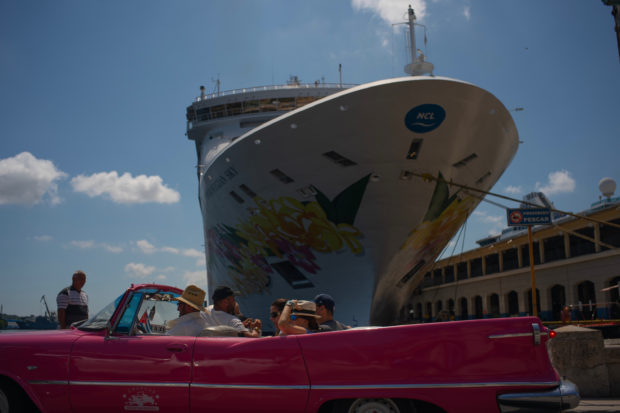Trump administration halts cruises to Cuba under new rules
WASHINGTON – The Trump administration on Tuesday ended the most popular forms of U.S. travel to Cuba, banning cruise ships and a heavily used category of educational travel in an attempt to cut off cash to the island’s communist government.
Cruise travel from the U.S. to Cuba began in May 2016 during President Barack Obama’s opening with the island. It has become the most popular form of U.S. leisure travel to the island, bringing 142,721 people in the first four months of the year, a more than 300% increase over the same period last year.

Tourists who have just disembarked from a cruise liner, tour the city aboard a vintage American convertible, in Havana, Cuba, Tuesday, June 4, 2019. The Trump administration has imposed major new travel restrictions on visits to Cuba by U.S. citizens, banning stops by cruise ships and ending a heavily used form of educational travel as it seeks to further isolate the communist government. (AP Photo/Ramon Espinosa)
For travelers confused about the thicket of federal regulations governing travel to Cuba, cruises offered a simple, one-stop, guaranteed-legal way to travel.
That now appears to be over.
“Cruise ships as well as recreational and pleasure vessels are prohibited from departing the U.S. on temporary sojourn to Cuba effective tomorrow,” the Commerce Department said in a statement to The Associated Press.
The new restrictions are part of a broader effort by the administration of President Donald Trump to roll back the Obama-era efforts to restore normal relations between the United States and Cuba, which drew sharp criticism from the more hardline elements of the Cuban-American community and their allies in Congress.
Article continues after this advertisementTreasury said the sanctions would take effect on Wednesday after they are published in the Federal Register.
Article continues after this advertisementU.S. national security adviser John Bolton, who declared Cuba part of a “troika of tyranny ” along with Nicaragua and Venezuela as he outlined plans for sanctions in November, said the new policy is intended to deny the Cuban government a vital source of revenue.
“The Administration has advanced the President’s Cuba policy by ending ‘veiled tourism’ to Cuba and imposing restrictions on vessels,” Bolton said on Twitter. “We will continue to take actions to restrict the Cuban regime’s access to U.S. dollars.”
The Cuban government imposed food rationing last month as a result of tightened U.S. sanctions and a drop in subsidized oil and other aid from Venezuela.
For the Cuban government, cruise travel generated many millions of dollars a year in docking fees and payments for on-shore excursions, although those figures were never made public.
Cuba also has become the most-requested destination for many South Florida-based cruise lines.
“The Trump administration deserves tremendous credit for holding accountable the Cuban regime,” Florida Republican Sen. Marco Rubio said. “The United States must use all tools available under U.S. law to counter the Cuban regime’s deceitful activities to undermine U.S. policy.”
The new restrictions take effect Wednesday, but the government said it will allow anyone who has already paid for the trip to go ahead with it. But the process going forward for passengers isn’t clear.
Cruise companies appeared to be caught off guard, with several, including Norwegian Cruise Lines and Royal Caribbean, urging ticketed passengers to be patient in response to queries on social media.
Finally, more than nine hours after the Treasury announcement, Royal Caribbean said it was canceling the Cuba stops on its June 5 and 6 cruises and would issue further guidance on future trips as soon as it was practical.
“We expect to know more within the next 24 hours and will communicate any changes as soon as we are able. In the meantime, we are adjusting the itineraries of our June 5 and June 6 sailings, which will no longer stop in Cuba. We are communicating with our guests about those changes,” Royal Caribbean said in a notice posted to its website.
Cruise lines carrying passengers booked before Tuesday had been hoping that they could request specific federal permits to complete their trips to Cuba, said Pedro Freyre, a Miami-based attorney who represents Carnival and three other major cruise lines.
“For now, it’s prohibited unless the cruise lines requests a specific license,” Freyre said. He said cruise lines had been trying to determine “if there’s any opening there to at least complete trips that have been booked and passengers that have made travel plans.”